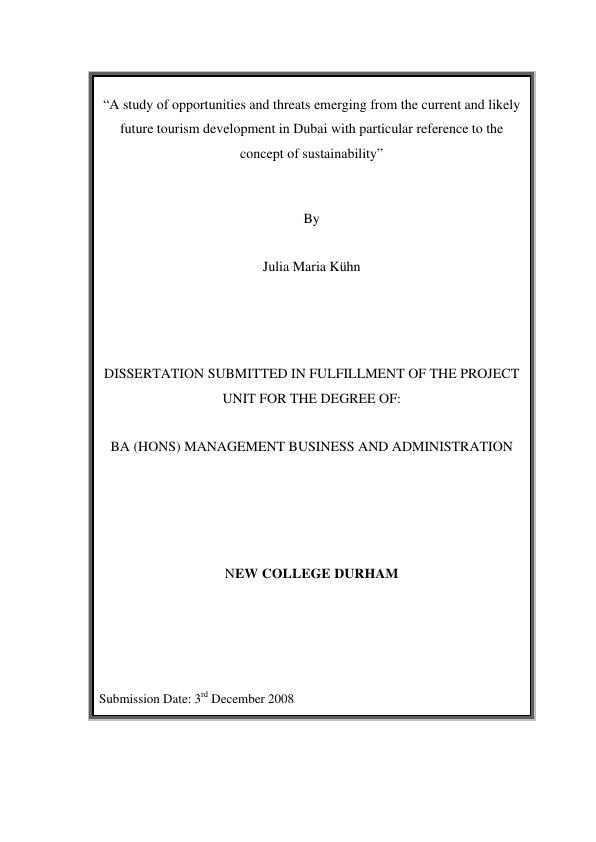This research project assesses the current and likely future tourism development in Dubai. Particular reference was given to the concept of sustainable tourism development. It was to be answered, whether the current scale of tourism development in Dubai is likely to be sustainable. In order to answer this question, the author has used several frameworks for assessing Dubai’s current scale of tourism development and its strengths and weaknesses as a tourist destination. Moreover the concept of sustainability has been introduced in this project. The importance of sustainable tourism development in Dubai had to be assessed; hence, the author demonstrated a choice of Dubai’s approaches towards sustainability. Finally recommendations are given of how to further tourism development in Dubai should be realised.
The research findings show that Dubai’s strategic tourism development is focused on quantity rather on quality. 20 years ago, Dubai consisted mainly of desert, today countless hotels, theme parks, and even artificial islands are being built to meet the current demand and to attract more tourists. Such a rapid development is not without criticism in terms of major negative sociocultural and environmental impacts. This piece of work highlights these impacts and points out whether they can be overcome or not.
Inhaltsverzeichnis (Table of Contents)
- ABSTRACT
- 1 INTRODUCTION
- 1.2 PURPOSE OF THE STUDY
- 1.3 COUNTRY OVERVIEW
- 2 LITERATURE REVIEW
- 2.1 THEORIES ON THE TOURISM INDUSTRY
- 2.1.1 TOURISM PLANNING, DEVELOPMENT AND MANAGEMENT
- 2.1.2 THE TALC-MODEL
- 2.2 IMPACTS OF TOURISM
- 2.3 THE CONCEPT OF SUSTAINABILITY
- 2.3.1 SUSTAINABLE TOURISM DEVELOPMENT
- 2.4 SWOT ANALYSIS
- 2.1 THEORIES ON THE TOURISM INDUSTRY
- 3 METHODOLOGY
- 3.1 WHAT IS RESEARCH?
- VALIDITY
- RELIABILITY
- GENERALIZATION
- TRIANGULATION
- 3.2 RESEARCH FAMILIES
- 3.2.1 SECONDARY DATA
- 3.2.2 PRIMARY DATA
- 3.3 RESEARCH TECHNIQUES
- 3.3.1 INTERVIEW
- 3.3.2 QUESTIONNAIRES
- 3.4 KEY CONCEPTS
- 3.5 ETHICAL ISSUES
- 3.1 WHAT IS RESEARCH?
- 4 RESEARCH FINDINGS
- 4.1 ANALYSIS OF TOURISM DEVELOPMENT IN DUBAI
- 4.1.1 TOURISM PLANNING IN DUBAI ACCORDING TO COOPER'S FRAMEWORK
- 4.1.1.1 Tourism Policy
- 4.1.1.2 Marketing Strategy
- 4.1.1.3 Taxation Structure
- 4.1.1.4 Infrastructure Developments
- 4.1.1.5 Education and Training
- 4.2 THE TOURISM PRODUCT IN DUBAI
- 4.2.1 TYPES OF TOURISM
- 4.2.2 VISITOR PROFILES
- 4.2.3 CURRENT PROJECTS
- 4.3 APPLICATION OF THE TALC MODEL TO DUBAI
- 4.4 IMPACTS OF THE TOURISM INDUSTRY IN DUBAI
- 4.4.1 ECONOMIC IMPACTS
- 4.4.2 SOCIOCULTURAL IMPACTS
- 4.4.3 ENVIRONMENTAL IMPACTS
- 4.5 SUSTAINABLE TOURISM DEVELOPMENT
- 4.5.1 THE NEED FOR SUSTAINABLE TOURISM DEVELOPMENT IN DUBAI
- 4.5.2 APPROACHES TOWARDS SUSTAINABILITY IN DUBAI
- 4.5.2.1 The Al Maha Desert Resort
- 4.5.2.2 Environmental Master Plan
- 4.6 PRIMARY DATA ANALYSIS
- 4.7 SWOT-ANALYSIS
- 4.1.1 TOURISM PLANNING IN DUBAI ACCORDING TO COOPER'S FRAMEWORK
- 4.1 ANALYSIS OF TOURISM DEVELOPMENT IN DUBAI
- 5 CONCLUSION AND RECOMMENDATIONS
- 5.1 EXAMINE THE KEY CHARACTERISTICS OF CURRENT AND LIKELY FUTURE TOURISM DEVELOPMENT IN DUBAI
Zielsetzung und Themenschwerpunkte (Objectives and Key Themes)
This research project aims to evaluate the current and prospective future tourism development in Dubai, with a particular focus on the concept of sustainable tourism development. The research examines whether the current scale of tourism development in Dubai can be considered sustainable.
- Tourism development in Dubai
- Sustainability in tourism development
- Economic, sociocultural, and environmental impacts of tourism
- Assessment of Dubai's strengths and weaknesses as a tourist destination
- Recommendations for future tourism development in Dubai
Zusammenfassung der Kapitel (Chapter Summaries)
The research project begins with an introduction that outlines the study's purpose and provides an overview of Dubai. The subsequent chapter, a literature review, explores theories on the tourism industry, including tourism planning, development, and management, along with the TALC model. This chapter also delves into the impacts of tourism and the concept of sustainability, specifically focusing on sustainable tourism development. The methodology chapter outlines the research approach, including research techniques such as interviews and questionnaires.
Chapter 4 presents the research findings, analyzing tourism development in Dubai based on Cooper's framework and examining the tourism product, visitor profiles, and current projects. The impacts of the tourism industry on Dubai's economy, sociocultural aspects, and environment are discussed, followed by an exploration of sustainable tourism development and the need for it in Dubai. The chapter concludes with a SWOT analysis of the current situation.
Schlüsselwörter (Keywords)
The main keywords and focus topics of this research project include tourism development, sustainable tourism, Dubai, economic impacts, sociocultural impacts, environmental impacts, tourism planning, TALC model, SWOT analysis, and sustainability.
Frequently Asked Questions
Is Dubai's current tourism development sustainable?
The research suggests that Dubai's rapid growth focuses more on quantity than quality, raising concerns about long-term environmental and sociocultural sustainability despite modern master plans.
What is the TALC model in tourism?
The Tourism Area Life Cycle (TALC) model describes the evolution of a destination from exploration to stagnation. The study applies this to Dubai to assess its current development stage.
What are the environmental impacts of tourism in Dubai?
Key impacts include high water and energy consumption, waste management challenges, and the ecological effects of massive projects like artificial islands.
How does Dubai approach sustainable tourism?
Dubai has initiated projects like the Al Maha Desert Resort and an Environmental Master Plan to mitigate negative effects and promote eco-friendly tourism practices.
What does a SWOT analysis reveal about Dubai's tourism?
Strengths include world-class infrastructure and safety, while weaknesses involve a lack of cultural depth and high dependency on international travel markets.
- Quote paper
- Julia Kühn (Author), 2008, A study of opportunities and threats emerging from the current and likely future tourism development in Dubai, Munich, GRIN Verlag, https://www.grin.com/document/137937



